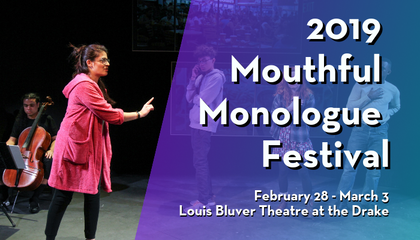|
BY ISABEL MEHTA Germantown Friends junior and PYP intern Isabel Mehta considers her time reading and selecting 2019 Mouthful Monologue Festival winners as part of the Final Committee.  As a high school student, it’s easy for me to get caught up in my own world. I interact with the same people everyday - sit with the same people at lunch, talk to the same people in class, workout with the same people on my crew team - so I rarely gain new perspectives and become aware of experiences other than my own. That’s why sitting on the Final Committee was so great for me, because for the first time ever, I read writing from students that didn’t attend my school and was exposed to a breadth of student voices and stories from across Philadelphia. When I first started reading monologues, there were some things that I began to notice. There were many repeating themes, such as gun violence, sexual abuse, teen pregnancy, and various reflections on race issues. And while this is a generalization, many schools that are considered “urban” definitely had more work submitted that stemmed from these themes. It was, at times, difficult and uncomfortable to read these monologues. But that’s what made them powerful. Sitting in the comfort of a heated office building sipping lukewarm coffee, I read about a girl confronting her abuser and reclaiming her body and her story. I read about a boy who’s best friend was shot dead in the streets. I read about a girl who longed to be pregnant only to be devastated by the arrival of her period every month. These were stories with weight behind them, stories that jumped out from the computer screen, stories that resonate with people and transcend all identities and experiences. As I began to read more from suburban schools, I came across more quirky, “out of the box”, submissions. A balloon laments over her inevitable demise after she is “let go” by a child at a birthday party. A magician declares he must be best friends with David Copperfield. A teenager has a poignant daydream in class. Reading these were powerful too, but for different reasons. All good writing can tackle real and relevant issues through the refreshing lens of humor, and these writers did it with ease. I absolutely loved the funny monologues. When it came time to decide the winners, most members of the Final Committee came to the table with similar ideas of which monologues deserved a spot in the festival. There were, however, a couple areas of disagreement. This was a reminder, to me, to remember that everyone comes from different backgrounds and experiences that make them resonate with a particular monologue. While some people really want to push for a piece about a recently divorced father struggling to reconnect with his daughter, others will strongly advocate for a powerful piece about the use of the n-word in the black community. There will always be sacrifices made and good work that will not make it into the festival - that’s the price for choosing only 18 winners out of over 600 submissions. But what can be controlled is the flow of the festival, the diversity of monologues selected, and how we can give a platform to messages and stories that the world needs to hear, right now. That, at its core, is truly what the Mouthful Monologue Festival is all about.
0 Comments
Leave a Reply. |
Categories
All
|
|
This work is licensed under a Creative Commons Attribution-NonCommercial-ShareAlike 2.0 Generic License.
|
|
© Philadelphia Young Playwrights - 1219 Vine Street, Floor 2 Philadelphia, PA 19107
Phone: 215-665-9226 Fax: 215-665-9228 Email: [email protected] |


